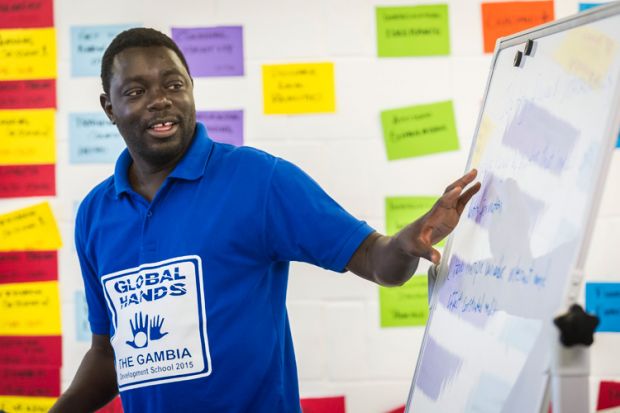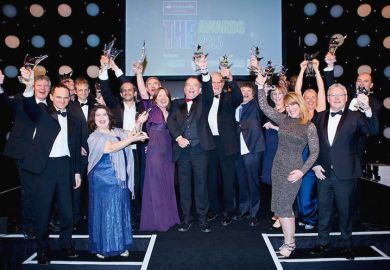Many academics might consider taking a group of undergraduates to Gambia twice a year to be going well beyond the call of duty.
But Momodou Sallah, senior lecturer in youth, community and education at De Montfort University, argued that it was a sign of the way ahead: an example of the global, hands-on learning that higher education institutions will increasingly be expected to provide in the years to come.
Dr Sallah’s leadership of the Gambia field trips won him the Most Innovative Teacher of the Year title at the Times Higher Education Awards in November, with the impact of the expeditions being best summed up by one student’s observation: “It changed my life.”
During the trips, third-year undergraduates studying youth and community development have undertaken development activities and observed at first hand some of the globalisation challenges that they have been studying.
Students have helped to build the Manduar Development Hub, a business incubation and training centre for young Gambians, and have completed placements with organisations such as health centres, women’s rights groups and the British embassy.
The initiative has now been extended beyond Dr Sallah’s own classes to allow other students to take part in development activities that are linked to their own studies: for example, media students have gained experience at Gambia’s only non-state radio station.
Dr Sallah said that putting theory into practice in a very hands-on way was the most effective means for students to learn, especially when it came to development issues.
“I can talk about globalisation but, if you go to a market in Gambia, the smells and the sounds will never leave you,” Dr Sallah said. “You learn to learn not only with your head but also with your heart; students learn about cultural competencies, about teamwork, and about organisational skills in a very practical and vivid way.”
The trips are certainly not holidays, with students being assessed on their participation. But the fun nature of many of the activities is the secret of their success, Dr Sallah said, combining apparently random but actually very structured learning with deep reflection afterwards.
He acknowledged, also, that taking groups of 20 to 30 students overseas for 10 days at a time is a challenging and time-consuming undertaking for any academic.
Dr Sallah said that hands-on learning did not have to take place overseas, or even far from campus; his students have also been working in some of Leicester’s most deprived neighbourhoods.
And he emphasised the importance of having local knowledge and contacts before undertaking overseas work: this was not a problem for Dr Sallah, who grew up in Gambia.
But he argued that international learning experiences would form an increasingly important part of degree programmes in the years to come.
“We live in an increasingly globalised world and there is competition for our graduates to be globally competent and literate,” Dr Sallah said. “Whether universities like it or not, we need to produce graduates who have got this knowledge and attitude, and it is only a matter of time before more and more universities are forced to do it.
“Students need to be able to situate themselves in increasingly complex scenarios which have globalisation written all over them and, if they cannot understand the processes of globalisation or cannot develop skills of global literacy, they will be significantly at a disadvantage.”
Dr Sallah said that the effort that individual academics put into international field trips was more than rewarded by the progress that students make.
“You are seeing the transformation that happens with students, and that is priceless,” Dr Sallah said. “You are looking at people putting theory into practice, looking at people who had no interest going out there and opening themselves up, understanding more about cultural competency and global literacy skills.
“The most transformative impact is on people as individuals and they report how their interaction with the world has changed.”
POSTSCRIPT:
Print headline: ‘You learn to learn not only with your head but with your heart’
Register to continue
Why register?
- Registration is free and only takes a moment
- Once registered, you can read 3 articles a month
- Sign up for our newsletter
Subscribe
Or subscribe for unlimited access to:
- Unlimited access to news, views, insights & reviews
- Digital editions
- Digital access to THE’s university and college rankings analysis
Already registered or a current subscriber?





